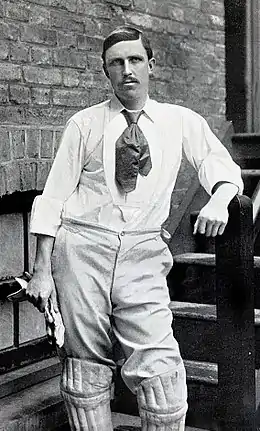Dick Lilley
Arthur Frederick Augustus "Dick" Lilley (28 November 1866 – 17 November 1929) was an English cricketer who played in 35 Tests from 1896 to 1909,[1] more than any other England wicket-keeper in the first sixty years of Test cricket. A Wisden Cricketer of the Year in 1897, he was described as "far and away the greatest cricketer Warwickshire has yet produced.[2]"
 | ||||||||||||||||||||||||||||||||||||||||
| Personal information | ||||||||||||||||||||||||||||||||||||||||
|---|---|---|---|---|---|---|---|---|---|---|---|---|---|---|---|---|---|---|---|---|---|---|---|---|---|---|---|---|---|---|---|---|---|---|---|---|---|---|---|---|
| Born | 28 November 1866 Holloway Head, Warwickshire, England | |||||||||||||||||||||||||||||||||||||||
| Died | 17 November 1929 (aged 62) Sandy Park, Bristol, England | |||||||||||||||||||||||||||||||||||||||
| Batting | Right-handed | |||||||||||||||||||||||||||||||||||||||
| Bowling | Right-arm medium | |||||||||||||||||||||||||||||||||||||||
| International information | ||||||||||||||||||||||||||||||||||||||||
| National side | ||||||||||||||||||||||||||||||||||||||||
| Test debut | 22 June 1896 v Australia | |||||||||||||||||||||||||||||||||||||||
| Last Test | 9 August 1909 v Australia | |||||||||||||||||||||||||||||||||||||||
| Career statistics | ||||||||||||||||||||||||||||||||||||||||
| ||||||||||||||||||||||||||||||||||||||||
Lilley made his debut for Warwickshire CCC in 1888, before they were a first-class county, and played for them continuously until 1911, making his test debut against Australia at Lord's in 1896. Lilley last played for Warwickshire in July 1911, retiring in "early August"[3] and the county went on to win the championship that year. His place was taken by Tiger Smith who played for Warwickshire until 1930. After his retirement, Lilley settled in Bristol and was a member of the special advisory committee which helped to re-establish Gloucestershire CCC after the Great War.[4]
The conservative cricket establishment of the time was not effusive in its appreciation of this great keeper mainly because he broke with the tradition of standing up to the faster bowlers as was practised by all the great keepers till then.[5] He did so on the advice of W. G. Grace who, on seeing him standing up to Tom Richardson, the legendary England fast bowler, suggested that he would "do better by standing back", which Lilley did for the rest of his career.[6]
He was renowned for his cricketing knowledge, and advised "a long succession of England captains".[7] However, he once started to set the field without consulting his county skipper, Frank Foster, 23 years his junior, who told him there and then to mind his own business. Foster later advised the Warwickshire committee to drop him.
"As a wicketkeeper he was most consistent and so pronounced an artist that at the end of his career his hands and fingers showed scarcely a trace of the heavy strain to which they had been subjected in taking bowling of all descriptions."[8]
References
| Wikimedia Commons has media related to Dick Lilley. |
- Dick Lilley. ESPN Cricinfo
- Wisden Cricketer's Almanack. London: John Wisden & Co. 1897.
- Lilley, A. A. (1914). Twenty-four years of cricket. London: Mills and Boon. p. 258.
- Wisden Cricketer's Almanack. London: John Wisden & Co. 1930.
- Wisden Cricketer's Almanack. London: John Wisden & Co. 1897."As a wicket-keeper Lilley has no superior at the present day against slow and medium pace bowling, but as it is his invariable custom to stand back to all bowling of great speed, he cannot be placed on quite the same level as Blackham, Mr. McGregor, or the late Richard Pilling."
- Lilley, A. A. (1914). Twenty-four years of cricket. London: Mills and Boon. p. 32.
- Warner, Sir Pelham (12 August 1911). "A. A. Lilley's retirement". Westminster Gazette."He was a most admirable and level-headed judge of the game, and his advice on critical occasions was almost invariably sought by a long succession of England captains."
- Wisden Cricketer's Almanack. London: John Wisden & Co. 1930.